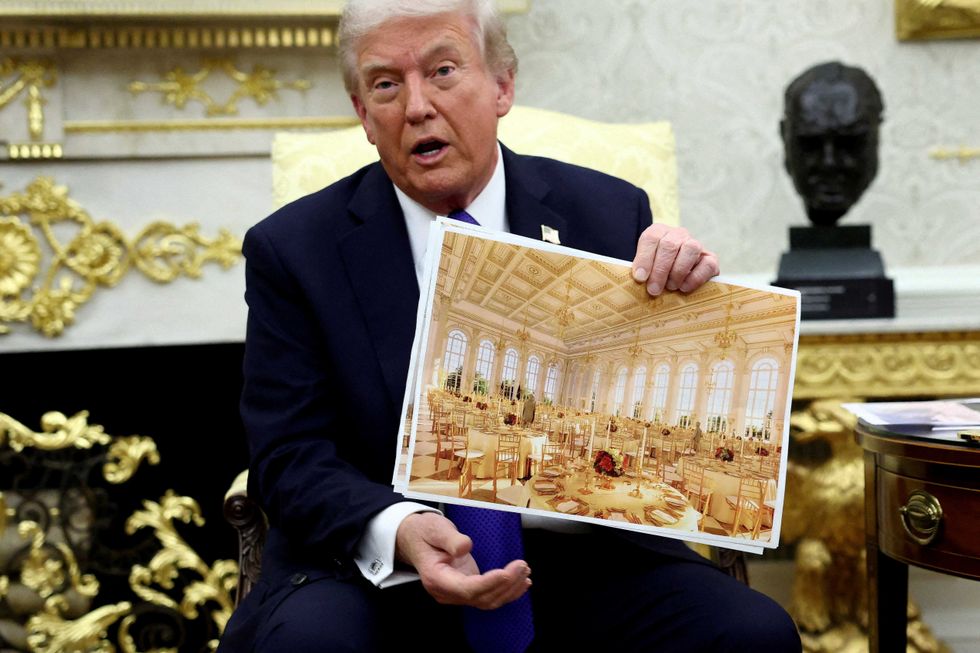Politics
Trump’s Power Expansion: House Shutdown Sparks Controversy

The House of Representatives, led by Speaker Mike Johnson, has remained in an unprecedented shutdown for over a month, a move many view as unconstitutional. Critics argue that this action, reportedly sanctioned by Donald Trump, effectively allows the former president to operate without congressional oversight, raising alarms about the erosion of democratic checks and balances.
James Madison and Thomas Jefferson, key figures among the Founding Fathers, emphasized the importance of separating powers within the government to prevent tyranny. Their writings highlight that a concentration of power undermines the democratic framework designed to hold leaders accountable. Yet, with the House effectively sidelined, Trump appears to be exercising unchecked authority.
The shutdown of the House has significant implications. Johnson’s decision to keep Congress in recess indefinitely has been interpreted as a maneuver to eliminate oversight over Trump’s actions. This situation is compounded by reports that Johnson is acting under Trump’s directive, a dynamic that many see as a shift towards a more autocratic governance style.
This unprecedented recess raises serious concerns about its legality. According to Article I, Section 5 of the Constitution, Congress must not recess for more than three days without a joint resolution from the Senate. Historically, Congress has remained operational even during significant crises, such as the Civil War. The current situation marks a departure from that tradition, prompting questions about the motivations behind this extended recess.
The implications of this shutdown extend beyond procedural norms. Critics argue that it enables Trump to pursue initiatives without the customary scrutiny from Congress. Reports suggest that the former president is planning significant alterations to the White House, including constructing a new ballroom, dubbed the “Epstein Ballroom,” without consulting the National Trust for Historic Preservation or following the required protocols for historic buildings.
While Congress has the authority to conduct oversight, the current recess has effectively paralyzed its ability to act. The House cannot introduce new legislation, issue subpoenas, or hold hearings, which are essential for maintaining accountability within the executive branch. This absence of checks raises the potential for Trump and his administration to implement policies and make decisions without fear of repercussions.
The stalemate also presents a risk to the integrity of the legislative process. With the House inactive, the Senate’s ability to legislate becomes severely hampered. Any legislation related to revenue or expenditures must originate in the House, according to the Constitution. This creates a scenario where Trump could operate with near-kingly power, raising concerns about the health of American democracy.
As the nation observes this unfolding political drama, the role of Congress in safeguarding democratic principles comes into sharp focus. The potential for a “procedural coup” raises questions about the future of governance in the United States. If this shutdown continues, it may usher in a new era where legislative oversight becomes a relic of the past.
In light of these developments, it remains critical for the public and other governing bodies to demand clarity and action. The implications of a prolonged congressional recess could redefine the balance of power in the U.S., prompting calls for immediate scrutiny and restoration of legislative functions. Absent proactive measures, the repercussions of this shutdown could fundamentally alter the landscape of American governance.
-

 Politics2 weeks ago
Politics2 weeks agoDallin H. Oaks Assumes Leadership of Latter-day Saints Church
-

 Sports2 weeks ago
Sports2 weeks agoSteve Kerr Supports Jonathan Kuminga After Ejection in Preseason Game
-

 Lifestyle2 weeks ago
Lifestyle2 weeks agoDua Lipa Celebrates Passing GCSE Spanish During World Tour
-

 Business2 weeks ago
Business2 weeks agoTyler Technologies Set to Reveal Q3 2025 Earnings on October 22
-

 Science2 weeks ago
Science2 weeks agoChicago’s Viral ‘Rat Hole’ Likely Created by Squirrel, Study Reveals
-

 Health2 weeks ago
Health2 weeks agoRichard Feldman Urges Ban on Menthol in Cigarettes and Vapes
-

 Entertainment2 weeks ago
Entertainment2 weeks agoZoe Saldana Advocates for James Cameron’s Avatar Documentary
-

 World2 weeks ago
World2 weeks agoD’Angelo, Iconic R&B Singer, Dies at 51 After Cancer Battle
-

 Lifestyle2 weeks ago
Lifestyle2 weeks agoKelsea Ballerini Launches ‘Burn the Baggage’ Candle with Ranger Station
-

 Health2 weeks ago
Health2 weeks agoCommunity Unites for Seventh Annual Mental Health Awareness Walk
-

 Business2 weeks ago
Business2 weeks agoMLB Qualifying Offer Jumps to $22.02 Million for 2024
-

 Entertainment2 weeks ago
Entertainment2 weeks agoNetflix’s The Hunting Wives Season 2 Set to Deliver More Twists








